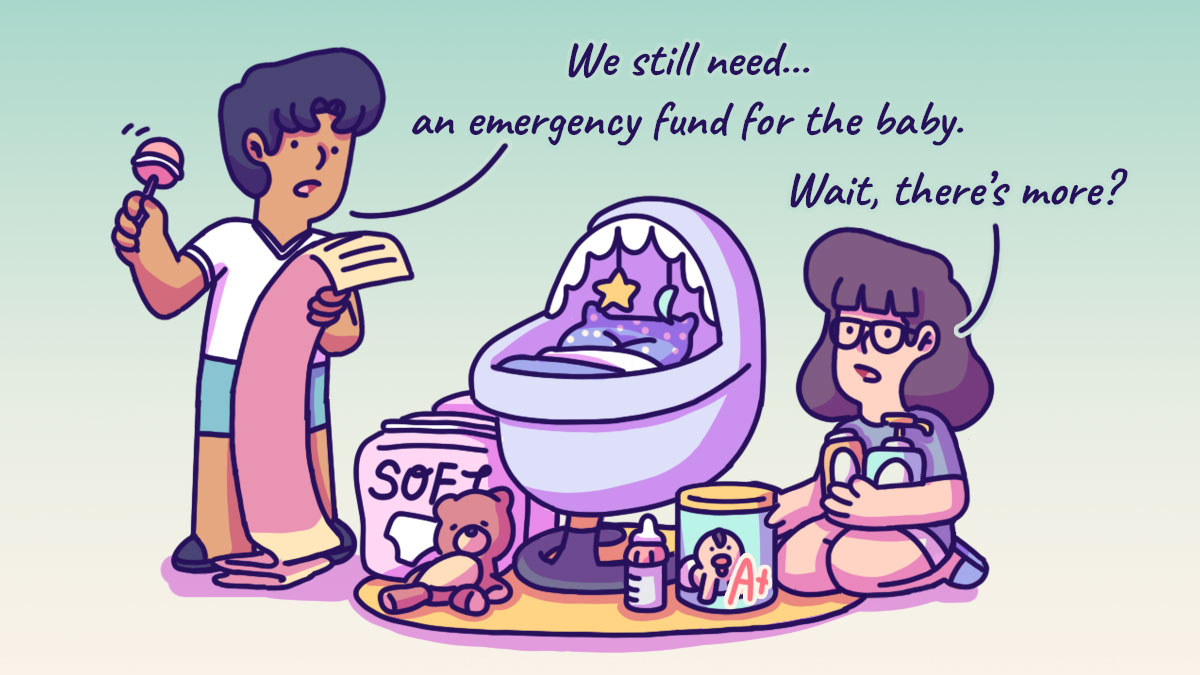Budgeting | Financial Planning | Life | Relationships & Family | Article
Financial Tips When You Are Thinking About Having A Baby
by Ooi May Sim | 31 Dec 2024

We’ve all seen movies and heard stories of babies keeping their parents up all night, turning them into exhausted zombies during the day. But raising a child doesn’t just involve time and energy – it requires a heck load of money too!
Planning for the financial impact a child will have on your immediate and long-term finances can help you prepare for it better.
Related
Find out how much your expenses will change after your child
To understand just how much you will need after having a child, start by listing down all the different potential costs you might face. This can be broken down into two categories – immediate costs and recurring expenses.
-
Immediate costs
Okay, we are not trying to scare you, but babies require a lot of stuff! From smaller items like bottles, baby wipes and toiletries to bigger stuff such as a crib, changing table, car seat and stroller, the list can be extensive. In addition to that, you might need to baby-proof your home with safety rails, table protectors and soft floor padding.
These costs can add up quickly, so it is important to identify and make a list of what you need. This way, you can choose to either buy it or source pre-loved items from relatives of friends to save money.
Budgeting for these can help you manage these expenses and prevent any negative impact on your finances.
-
Recurring expenses
Aside from the initial costs of having a baby, you’ll also be faced with a lot of recurring expenses such as diapers, baby milk formula, healthcare and childcare.
Once you have an estimate of these new expenses, review your current income and budget to see how you can accommodate them. Keep in mind any plans you may have, like taking extended leave from work to are for your newborn, as this could affect your income.
If you find you are falling short, be prepared to cut back on spending in other areas or find ways to increase your income.
Related
Ensure that at least one of you has a stable income
As you take on the new responsibilities of raising a child, it is important for at least one of you – whether it is yourself or your partner – to maintain a stable income.
Having a reliable source of income gives you financial security and increases the likelihood that you will be able to meet your financial obligations. It also reduces stress from financial uncertainties and aids in financial planning.
Set up and grow your emergency fund
Infants tend to fall sick regularly as they are still developing their immune system. This could result in unplanned trips to the clinic and unexpected medical expenses. Having a healthy emergency fund can help you manage these costs without resorting to debt.
If you don’t already have an emergency fund, now is the perfect time to start one. And although the ideal number is to have at least three to six months of living expenses, it is always good to have more saved up.
Plan for future expenses
Although your baby isn’t talking yet, it is never too early to start saving for their education. In fact, starting early gives you an advantage because of compounding interest. This allows your money to grow faster as you’ll be earning interest on your capital and on the interest you accumulate over time.
You should also consider exploring health insurance options for your child and look at potential extracurricular activities that align with their interests. Activities like sports, learning a musical instrument or taking computer lessons are great ways to nurture your child’s talent and hobbies.
The bottom line is that having children cost money! While many of us may not have immediate funds available to cover all these expenses, it is good to start planning and preparing for them now. By addressing these financial aspects early, you can manage these costs better and gradually build your savings, so you’ll be financially prepared by the time your baby arrives.

















